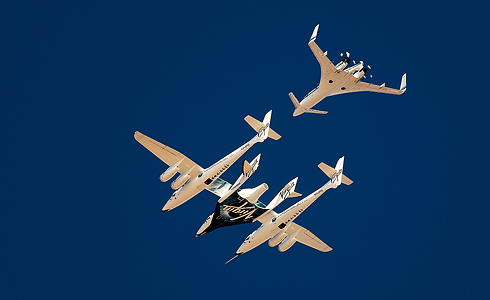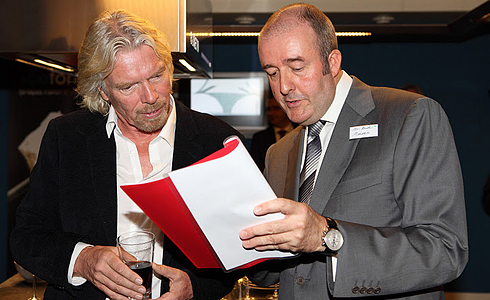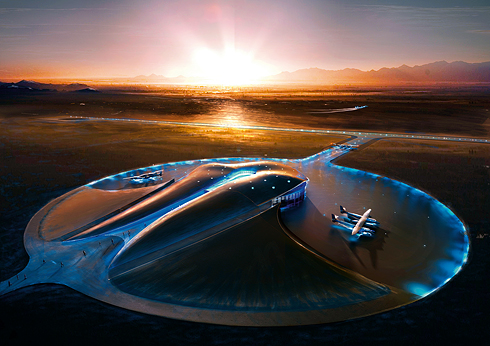Just a few years ago, the notion of space flight for all was a pipe dream, if only because of the costs involved. So only a few super-rich enthusiasts have been able to buy their way into the exalted ranks of cosmonauts and astronauts. In 2001, the American businessman Dennis Tito shelled out 20 million dollars to travel with the Russians to the International Space Station (ISS). In 2002, the South African Mark Shuttleworth lifted off, also in a Soyuz rocket, after paying the same ticket price. But that was about the end of it.
Space travel for beginners
Now space tourism has been given another boost: after several aborted attempts, Virgin Galactic will be opening up a porthole onto a new universe this year with its spacecraft Enterprise, which is commercial space travel. Compared to its namesake from the cult TV series Star Trek, Virgin Galactic's Enterprise is tiny. Instead of a crew of 400, the winged carbon tube will only provide enough room for six passengers and two pilots. And exploring the infinite vastness of space in the thing won't be possible either. Virgin's Enterprise will only scratch the surface of outer space while the flight guests float briefly around the cabin. Six minutes later the fun of zero gravity will be over and the earth's pull will reassert itself.

The state of zero gravity will last six minutes before the rocket begins its descent. The launch plane will carry the spaceship to an altitude of 16 km
The lightness of being
Needless to say, the suborbital jaunt will cost a king's ransom. But there are still plenty of hobby astronauts out there who are prepared to cough up 200,000 dollars for the lightness of being. 450 interested individuals have already signed up with Virgin Galactic. The dream of private space flight is within our grasp, which is also reflected by the fact that Allianz Global Assistance (AGA) and the International Space Transport Association (ISTA) are in the process of developing appropriate insurance programs for space tourism, scientific missions and space transport companies, such as Virgin Galactic, Xcor and SpaceLinq. Last November the insurer and the interest group signed an exclusive partnership agreement in The Hague. According to ISTA, there could be 50,000 flights worldwide by 2015. Six passengers per launch, means 300,000 paying space tourists per year.
"We'll be able to offer our insurance products and services to space travel companies, travel agents and ISTA members all over the world," explains Erick Morazin of Allianz Global Assistance in Paris. The entire range – including cancelation insurance, baggage and accident insurance, and insurance for passengers against rising fuel prices – will become available this year. Moreover, there are plans to offer advice and medical services for potential space travelers and psychological support for family members left behind on earth.

Galactic founder Richard Branson (left) and Erick Morazin of Allianz Global Assistance
Wealthy amateur astronauts
For the 530 or so professional space pioneers who have gone into space thus far and prepared for months on end for their missions, it must be a bitter pill to see their exclusive club being overrun by wealthy amateur astronauts, whose only qualification consists, at the most, of having seen all the Star Trek sequels. Virgin Galactic requires only two days of training, then off you go at nearly four times the speed of sound towards the Kármán Line at an altitude of 100 kilometers. That's where outer space begins, according to the definition of the Fédération Aéronautique Internationale (FAI). Anyone who's passed this point can call themselves space travelers, whether on an orbital or suborbital flight.
We don't know when the industry will venture deeper into space and astronauts in private rockets will travel between the stars, but it's no longer an utopian idea. "When we get that far, we'll have the appropriate solutions ready," says the far-sighted Morazin. At the moment, however, the Frenchman is concentrating on conquering the near-earth zone. He's counting on the trailblazing Virgin Galactic, with whom he intends to cooperate closely to market his insurance products. Anyone booking a ticket on the Virgin webpage for a galactic sightseeing tour will be directly connected via a link to the Allianz subsidiary's insurance service.
Virgin founder Richard Branson had initially announced that the maiden flight of his Enterprise would take place in 2007. Now the entrepreneurial billionaire has set his sights on September 2012. Numerous successful test flights have already been launched from the space flight terminal Spaceport America in southern New Mexico, which was designed by top British architect Norman Foster. Branson intends to station a fleet of two launch planes and five rocket spaceships there. The launch carriers will take the mini-spaceships to a height of approximately 16 kilometers, where they will decouple. The spaceships will then cross the Kármán Line propelled by their own rocket boosters.

High tech in the desert: the first tourist astronauts are expected to travel into space from Spaceport America in southern New Mexico this year
Captain Kirk stays on the ground
Erick Morazin is expecting a completely new sector to emerge for commercial space travel in the coming years. "Space tourism will become as natural for the next generation as air travel is for us today," he says convincingly. To boldly go where no insurance company has gone before, Morazin is relying on SpaceCo, a subsidiary of Allianz Global Corporate & Specialty (AGCS). As one of the world's leading insurers of satellites, SpaceCo knows all about the specific risks involved in space travel. Morazin would also like to bring Allianz Global Investors on board, since the Enterprise recruits are all wealthy clients for whom not only the gateway to space but also new business opportunities may be opened up.
The first candidates for a trip on the Enterprise include the scientist Stephen Hawking (The Universe in a Nutshell), film director Bryan Singer (X-Men) and designer Philippe Starck (rocket-shaped lemon squeezer known as the Juicy Salif). Originally it was hoped that William Shatner, alias Captain Kirk from Star Trek, would join the Spaceship Enterprise, but the actor declined. He said that he would like to go up sometime but wants a guarantee that he'll return safe and sound. Shatner was also worried that he might get sick during the flight. "I'm interested in man's march into the unknown," said the 81-year-old, "but to vomit in space is not my idea of a good time."
This article was first published in the corporate magazin "Allianz Journal".
As with all content published on this site, these statements are subject to our Forward Looking Statement disclaimer.
Link to the disclaimer